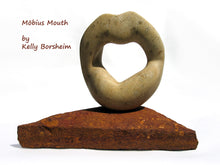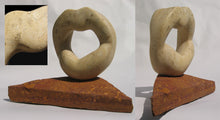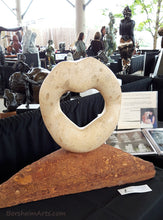- Stone
- 17 x 22 x 9 inches
- Sold, Private Collection, Little Rock, Arkansas
Möbius Mouth
Rattlesnake Limestone (Texas)
with Henna Limestone (Canada)
one-of-a-kind
17" h x 22" w x 8.5" d
© 2006 Kelly Borsheim
Private Collection
Little Rock, Arkansas
Many different ideas come together to form a single idea for a work of art. That is the case with Möbius Mouth. I bought this particular piece of creme Rattlesnake Limestone from another Texas carver that I know. This stone is named after the shape of the fossil shells embedded in the limestone - they resemble the rattle on the tail of that well-known snake.
When I have a busy patterned stone, I want to carve a simple shape to show off the personality of the stone. Mathematics, in one form or another, never seems to be far from my mind, so I decided to sculpt a Möbius Strip in the shape of an open mouth as part of my Lips Series.
Möbius Mouth Stone Carving
by Kelly Borsheim
Take a long strip of paper or a ribbon, such as 1” wide by 10” long. As you pick up one end, give it a half twist before attaching it to the other end to form a ring. You will now have a Möbius Strip, which means that you may "travel" from one side of the ring to the other without crossing an edge. Named for German mathematician and astronomer August Ferdinand Möbius (1790-1868), a Möbius Strip only has one side and one edge.
My 2-part stone sculpture Möbius Mouth is part of my Lips Series. The mouth has a heart shape in the negative space inside the lips. He is carved from a Rattlesnake Limestone from Texas, named after the shape of the shell fossils in the stone. The triangular base enhances the idea of the mathematics of the Möbius lips and is carved from Henna Limestone from Canada. He also has some wonderful fossils that I hope you will discover.
Limestone sculpture may be displayed indoors or out. The top piece rests on a stainless steel pin (so no rust) that is permanently mounted into the red stone base. However, the mouth top is able to swivel so you may show off the fossils on all sides to your sculpture admirers. Both stones have been sealed for protection from finger oils and the environment, so please – touch and enjoy!

See the fish in the yellow and red Henna limestone above?

Henna Limestone from Canada: This rich brick red colored stone is saturated with golden fossil patterns in which I find I can lose myself for hours while staring at them. The image above shows a close-up of a shape that several people have told me looks like a fish about to eat a sausage. In the upper left corner, you get a slight view of the nautilus shell that faces upwards. I discovered this when I split the stone to arrive at my basic triangular shape. There are tiny crystals in the larger holes of the fossil and I wanted to leave this little gem in my sculpture. I hope you enjoy this original artwork. He is absolutely one of a kind!
Carving the Original Art Sculpture ~ Texas Rattlesnake Limestone and Canadian Henna Limestone
4 February 2006: Idea is mostly here. Begin to draw on stone.
5 March 2006: More drawing to fine-tune the form and lines that I desire. I sketch with pencil on the unpolished stone. Sandpaper will remove all traces of this during the polishing process. By the way, that block of marble you see in the background later became the Gymnast (Colorado Yule Marble). 

5 April 2006: By this point, I have decided on a triangular base and I tested various stones that I had to see what color combination struck me as the most pleasing. In order to see its color, I polished a small section of the stone that will sit near the other stone. Then I wet both stones together for more information.
The red and yellow of the henna limestone works with the warmth of the creme-colored limestone above it. I also liked that both stones had fossils -- to me they work together in a manner similar to patterned quilting fabrics.

16 April 2006: Splitting the stone base. Many people ask me how long it takes to make one of my sculptures. I do not have an answer because I do not think of my work in terms of a time clock. Why did it take me 10 days after choosing the stone to begin carving it? Well, I like to think about my choices long before I ever make a cut. In this case, I wanted to make sure that I liked the shape I think I wanted. Was a "base" the best use of that stone?
Also, I tend to work on many pieces at any given time (one at a time, but throughout the day I switch projects as they require.). Never underestimate the value of incubation. It is the majority of the work. Conception is where the fun begins.







